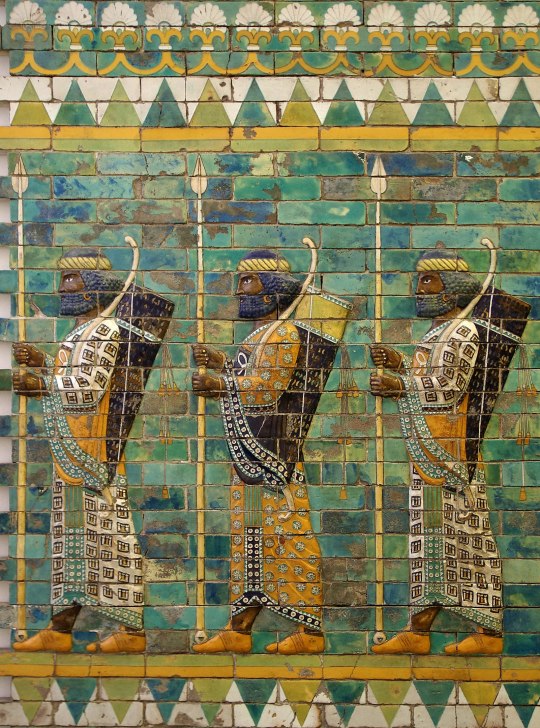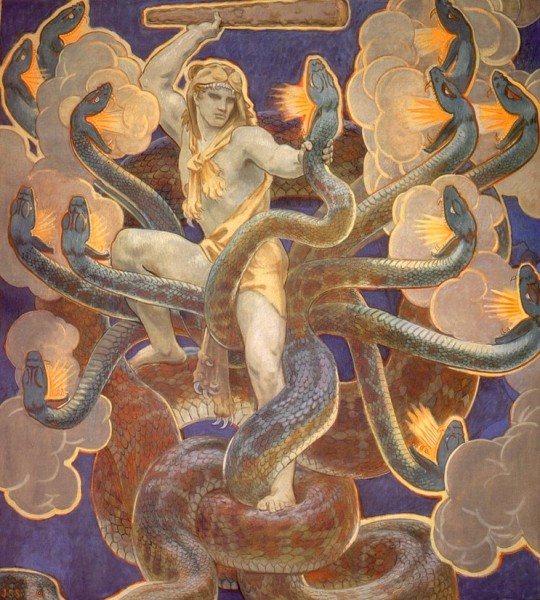Text

Roman Marble Sarcophagus Lid Fragment
Origin: MediterraneanCirca: 3rd Quarter of the 3rd Century AD Dimensions: 11" Height x 20" Length (28 cm x 51 cm) excluding stand Medium: Marble
2 notes
·
View notes
Text

Relief with Achaemenid warriors.
Pergamon Museum in Berlin
Photo: Jakub Hałun
353 notes
·
View notes
Text

Relief of Maya praying to the gods
Maya was Chancellor and Overseer of the Treasury during the reign of Kings Tutankhamun, Ay and Horemheb. New Kingdom, late 18th Dynasty, ca. 1332-1292 BC. Tomb of Maya, Saqqara necropolis.
281 notes
·
View notes
Text

Greek Geometric Pottery Amphora
Origin: Mediterranean Circa: Geometric Period, c. 725-700 BC Dimensions: 18.75" Height x 10" Width (47.6cms x 25.4cms) Medium: Terracotta
#ancient art#ancient history#antiquities#ancient civilizations#greek mythology#greek pottery#greek geometric period#amphora#geometric art
14 notes
·
View notes
Text

Contest between Apollo and Hercules for the Delphic tripod
* Temple of Apollo Palatinus, Rome
* 1st century CE
attribution: Sailko, CC BY 3.0 https://creativecommons.org/licenses/by/3.0, via Wikimedia Commons
284 notes
·
View notes
Photo

Hercules and the Hydra by John Singer Sargent (1921)
5K notes
·
View notes
Text

Title: The Mourning Mary Magdalene Artist: perhaps Colijn de Coter (Flemish, ca. 1440/45 - ca. 1522/32) -- attribution contested Date: ca. 1500 Genre: religious art Period: Early Netherlandish Medium: oil on panel Dimensions: 112.3 cm (44.2 in) high x 55.3 cm (21.7 in) wide Location: Museum of Fine Arts, Budapest, Hungary
342 notes
·
View notes
Text

Ancient Pottery from the Italo-Geometric period, Cypro-Geometric, and Attic.
#ancient art#ancient history#antiquities#ancient civilizations#greek mythology#antiquity#ancient cultures#greek pottery#geometric period#attic vase
10 notes
·
View notes
Text

"Hathor, patroness of the west, who is represented as a cow emerging from the western mountain at Thebes into the clumps of papyrus that fringe the Nile Valley. She wears around her neck the pendulum shaped counterpoise and loosely strung bead rows of a 'menyet' collar.
The 'menyet' collar provides source of sound when shaken and particularly associated with the goddess' worship. Between her horns are a sun-disc and tall plumes."
Papyrus of Ani, British Museum, EA10470,34
237 notes
·
View notes
Photo

A bust on the painted loggia at Palazzo Altemps in Rome, Italy | myleslea
12K notes
·
View notes
Text

Khmer Sandstone Torso of Lokesvara
Origin: CambodiaCirca: 10th Century AD to 11th Century AD Dimensions: 12.5" Height x 12" Width (31.8 cm x 30.5 cm) excluding base Medium: Sandstone
#ancient art#ancient history#antiquities#ancient civilizations#khmer#khmer sculpture#stone torso#ancient statue#cambodia
16 notes
·
View notes
Text

Mery, Chief Scribe of the Royal Archives, depicted upon the false door from his tomb at Saqqara.
Old Kingdom, 4th Dynasty, ca. 2613-2498 BC. Now in the Louvre. N 153
146 notes
·
View notes
Photo

Detail of Dionysos, Hermes, and satyrs from a terracotta amphora, attributed to a member of the Bateman Group
Greek (from Attica), c. 530 B.C.
Metropolitan Museum of Art
310 notes
·
View notes
Photo

A harmonious union. The Three Graces by Raphael, Musée Condé, Chantilly, France. Date: 1503-1505.
119 notes
·
View notes
Photo

shiningjasmin
Two unicorns.
Minoan fresco from Akrotiri (Santorini).
Approximately 1500 BC.
Currently preserved at the Museum of Heraklion.
365 notes
·
View notes

